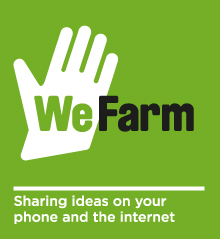 Farmers in developing countries all over the world ask a lot of the same questions. They’re the kind of questions that would quickly turn you or I to Google, Wikipedia or maybe even Yahoo! Answers: What’s the cheapest way to get rid of this infestation? What’s the best fertilizer for this plant? Which kinds of crops will grow best on my land?
Farmers in developing countries all over the world ask a lot of the same questions. They’re the kind of questions that would quickly turn you or I to Google, Wikipedia or maybe even Yahoo! Answers: What’s the cheapest way to get rid of this infestation? What’s the best fertilizer for this plant? Which kinds of crops will grow best on my land?
But according to new Knight News Challenge winner WeFarm, a project of the Cafédirect Producers’ Foundation, only about 25 percent of the world’s population has access to the Internet (it may be a little higher now). For them, trying to get answers to simple questions about their livelihood is, as program manager Kenny Ewan put it, “kind of like 10 years ago if your PC broke and you had to spend two hours on the phone with the manufacturer, who tells you to switch it off and switch it on again.”
Now, thanks to the WeFarm team, those farmers are able to help each other answer those questions, regardless of barriers of language and distance.
Founders Ewan and Claire Rhodes originally envisioned WeFarm as a purely web-based project. But as they connected with more smallholder farmers, they discovered that while only about 5-6 percent of their target population had reliable internet access, over 90 percent were familiar users of texting and mobile phones. They decided that what farmers in the developing world need is a database of useful information that’s accessible whether you use a desktop PC at an Internet cafe, a brand new 4G-enabled Samsung Galaxy, or a basic flip phone.
On its face, WeFarm is not a news project; its parent organization is an NGO that specifically works with tea, coffee and cocoa farmers across 14 countries. (It’s also the charity arm of the U.K. hot-beverage vendor, Cafédirect.) But what makes WeFarm relevant to the Knight News Challenge is the speed with which it’s making international communication possible.
“For people that never talk to anyone outside of their own community,” Ewan said, “to receive a text from someone on the other side of the world is kind of magic.”
Behind that WeFarm “magic” is web-to-text technology that facilitates the gathering and disseminating of information via mass SMS. Someone sends a text, which is then entered into a computer database, translated, and shot back out to users across the world. Ewan says, once WeFarm is running at full speed, that could mean receiving thousands of texts a day. So the site is developing a voting mechanism that will allow users to rank the usefulness of answers. In addition, volunteer translators will be able to tag questions with key words in multiple languages. “So if a farmer in Mexico is consistently answering questions about a certain type of tree and getting high ranks for those answers, it will recognize those questions as ones that should be targeted to him,” Ewan said.
WeFarm uses a commercial Android app called Telerivet, which allows them to operate their system countrywide using a single Android phone. But Ewan also spoke admiringly of FrontlineSMS, an open source software project (and fellow News Challenge winner) that allows users with a laptop and a modem to send out mass texts from a computer. It’s been used to facilitate mass communications among refugees and by hospitals to remind HIV/AIDS patients to take their medication. It’s also a major component of the much-lauded Kenyan violence mapping project Ushahidi.
“We take that text-to-web thing lightly, for granted, in the Western context because we all have smartphones, and so the interaction between the phone and the computer seems a pretty straightforward thing,” said CFP general manager Claire Rhodes. “But actually, on an old-school, non-smart mobile phone handset, that’s actually a system that isn’t used.”
But as WeFarm discovered via a 2011 survey, even the existing technologies can’t entirely eradicate the barriers between the developing world and the web: “Mobile phone tariffs and internet charges are too expensive for many small-scale farmers and high illiteracy levels limit written communications, including SMS and email. Frequent power cuts make re-charging mobile phones a challenge.”
Ewan says it’s important to remember how much innovation there is going on around mobile, especially in the developing world. Phone companies, for example, who have a stake in making sure their customers use their devices frequently, supply them with free solar chargers. And down the road, Ewan says WeFarm hopes to make wider use of voice recognition technologies so that community members unable to write out a text can still get their questions answered.
But the immediate goal for WeFarm is to build a permanent user platform and execute a business plan that will actually generate revenue. “Something we’ve talked about a lot is whether or not people should pay for messages,” Ewan said, “I think it is important that people spend at least a minimum to send a message, because…people need to value the service and value the information that they’re getting from it.”
Ideally, especially helpful responders could one day see dividends from WeFarm — another important step in the journey toward monetizing accurate and accessible information. “If a farmer in Kenya shares a tip, and people around the world take advantage of that tip, then there’s a reward, value on that knowledge,” said Ewan, “and it’s generated through the WeFarm business model.”